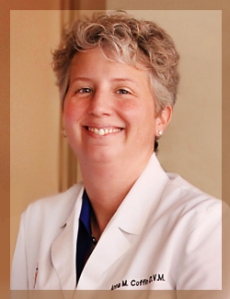Ask Dr. Anna: Guthrie vets reveals … Vaccines!
For all columns with Dr. Anna visit her blog here.
This is the fifth part of a Guthrie vet wants to take you on a journey. You have finally arrived for what you actually came for.. the vaccines. Hopefully, by now you have realized that every step in this process is just as important, if not more important, than the actual vaccines. I will divide this section into three parts. The first part will discuss why vaccines are necessary, the second part will discuss dog vaccines and the third part will discuss cat vaccines.
Puppies and kittens get protection from many different diseases from their mother’s first milk, also known as colostrum. These antibodies stay present in the puppy’s bloodstream until they are 8-16 weeks of age. Once these maternal antibodies start to decrease a series of vaccines will need to be given to stimulate your pet’s immune system. Vaccine schedules can vary from vet to vet, but most veterinarians recommend a series of three vaccinations one month apart for all puppies and kittens. I recommend vaccinating at 8, 12, and 16 weeks and then once yearly.
I also recommend your pet has a comprehensive physical exam prior to giving the vaccines. Sick animals cannot properly respond to the vaccine and it would be a waste of your money. If your pet is already showing symptoms, the vaccine will not help your pet get better or recover from the disease. Average cost of the distemper vaccine and an exam is around $45. The cost of the vaccine is very low compared to the cost of treatment which could run $500-$1000. There is no cure for many of these diseases. Treatment usually involves intravenous fluids, support care and treatment of symptoms until the animal gets better. Many times, even with proper care, pets die from these preventable diseases.
Many people are concerned about vaccine reactions and the possibility of the vaccines causing auto immune disease. No specific dog or cat breed is prone to vaccine reactions. A recent article published in the Journal of Veterinary Medical Association revealed a two year study that administered 3,439,576 doses of vaccine to 1,226,159 dogs. Only 0.38% of over one million dogs had any type of vaccine reaction! This proves that the risk of getting the disease is much higher than the chance of your pet having a reaction. Call your veterinarian today to schedule your pet’s vaccine appointment.
Please e-mail me with your questions at ACoffin@aol.com and put “Ask Dr. Anna” in the subject line or mail your questions to 123 West Harrison Guthrie, OK 73044.
Spay and neuter your pets!
“The reason dogs have so many friends is because they wag their tails and not their tongues.” author unknown


You must be logged in to post a comment.